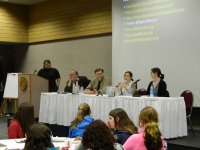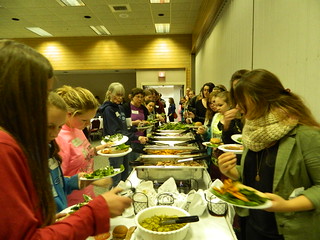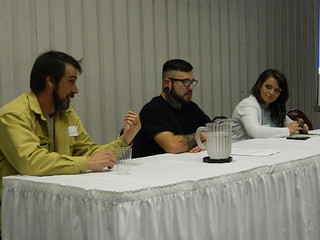Great crowd and lots to learn at KFTC’s fifth annual Growing Appalachia conference

About 190 people attended KFTC’s fifth annual Growing Appalachia conference in Prestonsburg, a record for the one-day event focused on ways people in eastern Kentucky can earn or save money or grow a business through agriculture and clean energy solutions.
“What we are seeing across eastern Kentucky is nothing short of revolutionary,” said panelist Ralph Davis, who manages the Floyd County Farmer’s market. “People are returning to family farming. They are taking ownership of their lives and doing something new. Farming is an act of creation. And it is one of the ways this region can heal.”
Among the crowd were many students and teachers, including 15 middle schoolers from Letcher County, high school students from Floyd County, and college students from the University of Pikeville and Big Sandy Community and Technical College, among others. As a teacher from Letcher County explained, “We are just getting started this year with a garden at our school and have plans to build a greenhouse. We are all learning together and thought this would be a great experience.”
The conference featured 9 workshops, from which people could choose 3, plus a panel discussion about local community development efforts in Elkhorn City, Whitesburg, Prestonsburg, and Hazard. Workshop topics included organic pest control, bio-intensive gardening, farm-to-institutional marketing, ways to use wood for energy, collecting and marketing wild edibles and medicinal herbs, do-it-yourself home weatherization, on-farm renewable energy, and two workshops featuring panels of people who are farming and starting new businesses in the mountains.
In a workshop about marketing farm produce to schools, hospitals and other institutions, Terry Crist, who serves as Executive Chef at Manchester Memorial Hospital, described his definition of local food. “I don’t define local as anything grown within a 100 or 200 mile radius. To me, local food is grown by someone I know. The relationship between producers and institutions is like a marriage. You learn together over time.”
Two experienced home-builders led a workshop about do-it-yourself strategies to tighten up leaky houses and reduce home energy costs. “Our specialty is building energy efficient, affordable homes for citizens of Harlan, Leslie and Bell counties,” explained Blake Enlow, executive director of a nonprofit housing group known as COAP. He and Chris Woolery, an energy specialist who works with MACED, discussed many of the least cost, highest value energy upgrades homeowners can make. “Insulating the attic and floors is like putting a hat and socks on your house,” Woolery explained. “The important thing to keep in mind is that these investments pay for themselves.”
Several of the most well attended workshops focused on best practices for gardening and collecting wild plants. Cathy Rehmeyer described her strategies for growing food on a small lot in Pikeville. “I’m here to say that you can work full time, have a family, and still grow a tremendous amount of food,” she said. “I grew 1 ton of food on 6/100 of an acre. And I grow food all year round.” Janet Meyer described ways to minimize crop pests without using many chemicals, including crop rotation, planting a diversity of crops, creating habitats for helpful insects, and physically removing pests and diseased plants. Lastly, Cody Montgomery of Morehead was back by popular demand to share his vast knowledge of wild edible and medicinal herbs.
Among the workshops offered for the first time this year were two sessions on specific forms of renewable energy: one on various ways to use wood energy and another featuring ways to use renewable energy and energy efficiency to reduce on-farm energy costs. Pete and Brenda Cashel of Terrapin Hill Farm described steps they have taken on their farm to reduce energy demand and generate more from renewables. Aaron Dourson of Powell County shared how he has built a kiln on his property to produce biochar, a form of charcoal that can be used to improve soil quality and sequester carbon dioxide.
Throughout the day, several speakers described ways they had benefited from participating in Growing Appalachia in years past. Dave Fisher, a farmer who has recently opened a store selling local produce in downtown Whitesburg, shared his experience. “Last year at this time I had a vision, but I didn’t have it crystallized,” he said. “I came here and met people who were doing the things I was dreaming about. I learned about organizations like MACED (the Mountain Association for Community Economic Development) who could help me get started. Here in eastern Kentucky and the whole Appalachian region, we’ve always had hard times. But I see a lot of opportunity. Go search out MACED, KFTC, and Community Farm Alliance. You’ll find a lot of support.”
This year’s conference featured presentations by many local entrepreneurs and community leaders. Lacy Hale, an artist from Whitesburg, described her work to develop a regional artists’ network called EpiCentre Arts. “We believe that art is vital to the health and well-being of the individual and the community. There is so much talent here: in fine arts, traditional arts, playing music and more. People are starting to see how important the arts are. We are excited to be part of that and help shape the future of our communities.”
Tim Belcher of Elkhorn City also spoke about the arts and adventure tourism as central parts of community revitalization efforts. “When you are working as a community leader or organizer, you have to find the people in your community who have passion. Some people are into the arts. Some are passionate about whitewater. You’ve just got to learn what they care about and set them in motion. And then, once you’ve got things moving locally, we’ve all got to work together as a region.”
Jenn Noble, owner of the Treehouse Café and Bakery in Hazard, was asked about her goals as a young entrepreneur. “My goal is to inspire other young people in eastern Kentucky to follow their dreams, be creative, and make our communities better.”
This year’s Growing Appalachia conference was organized and hosted by the Big Sandy Chapter of Kentuckians For The Commonwealth and co-sponsored by MACED, Community Farm Alliance, the Floyd County Farmer’s Market, and Grow Appalachia. Members of the planning team included Todd Howard, Nathan Hall, Beverly May, Kathy Curtis, Martin Richards, Valerie Horn, Will Bowling, Chris Steele, and Cody Montgomery. A locally sourced lunch featured meats, vegetables, and bread produced by Todd Howard, Berea College, Appalachian Meats, and the Bruno family of Holy Mountain Farm. Special appreciation is due to all of the workshop presenters and panelists who generously donated their time and expertise.
Recent News
Kentucky’s past legislative session showed alarming trend toward government secrecy
Churchill Downs takes more than it gives. That's why the Kentucky Derby is a no-go for me
‘We must never forget.’ Kentucky town installs markers for lynching victims.
Featured Posts
Protecting the Earth
TJC Rolling Out The Vote Tour – a KFTC Reflection Essay
KFTC Voter Empowerment Contractor Reflection Essay
Archives
- Home
- |
- Sitemap
- |
- Get Involved
- |
- Privacy Policy
- |
- Press
- |
- About
- |
- Bill Tracker
- |
- Contact
- |
- Links
- |
- RSS





Add new comment